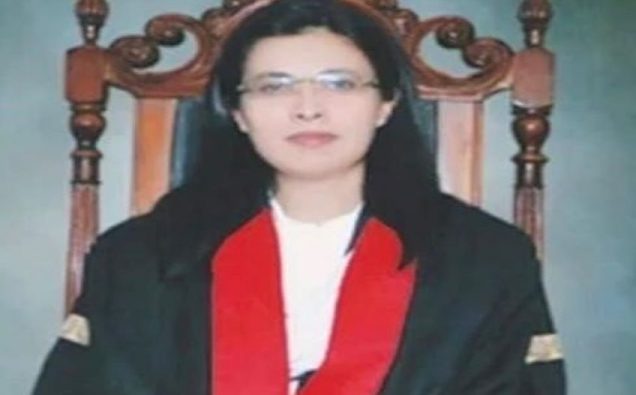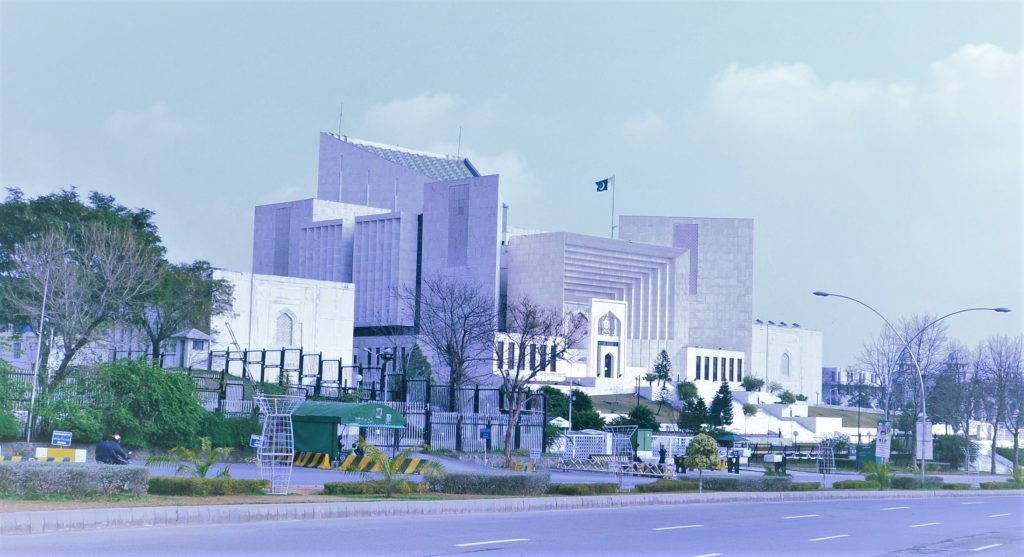
For the first time in the country’s history, the Judicial Commission of Pakistan (JCP) plans to elevate a woman judge to the Supreme Court when it meets on Sept 9.
Justice Ayesha A. Malik is fourth on the seniority list of the Lahore High Court. If elevated to the apex court, she will remain a judge of the Supreme Court until March 2031.
Currently, the sanctioned strength of the Supreme Court is complete with 17 judges. Justice Ayesha will fill the vacancy when senior judge Justice Mushir Alam will reach superannuation on Aug 17.
In neighboring India, Justice Fathima Beevi was the first woman judge to have been elevated to the Supreme Court of India. She retired in April 1992. Since then eight female judges had been elevated to the top court of India of which Justice Indira Banerjee is still serving as a judge of the Supreme Court.
Pakistan’s political and civil society leaders have welcomed the prospect of the first woman judge on the bench of the Supreme Court.
Commenting on the development, Sindh High Court Bar Association president Salahuddin Ahmed said Justice Ayesha Malik enjoyed fine reputation as a judge. Moreover, it would be wonderful to see more women in the upper echelons of the judiciary, he added.
“Had the seniority principle been followed, we would have had a woman chief justice of the LHC and a judge of the Supreme Court back in 2002-03 when Justice Fakhrunissa Khokar was wrongly and repeatedly bypassed,” he said, regretting that a number of senior judges had been overlooked not only from Punjab but also from other provinces.
“We are against the principle of pick and choose and thus we cannot support any out-of-turn appointment made to the apex court by the JCP unless it frames consistent objective criteria for making such choices,” Salahuddin Ahmed said.
Justice Ayesha Malik has offered her services in the past as pro bono counsel for NGOs working in poverty alleviation, microfinance programs, and skills training programs.
She has authored a number of publications, including Why Trade in Financial Services: An assessment of the Agreement on Trade in Financial Services under the GATS, the Journal of World Investment, the 12th edition of the Global Report 2004 on the Independence of the Judiciary-Pakistan Chapter and Pakistan Secular Laws.
Justice Ayesha Malik also compiled the Supreme Court of Pakistan 1956-2006 Selected Cases published by the Pakistan College of Law on the 50th anniversary of the Supreme Court. She also contributed to the Merger Control, Getting the Deal Through, being an International Journal of Competition policy and Regulation Global Competitive Review.
During her high-profile legal career, Justice Ayesha Malik had been a reporter for Pakistan for the Oxford Reports on the International Law in the Domestic Courts, a publication of the Oxford University Press.

In addition, she has taught banking law at the University of Punjab, Department of Masters of Business and Information Technology, and mercantile law at the College of Accounting and Management Sciences, Karachi. She spent many years voluntarily teaching the English language and developing communication skills at Herman Meiner School in Lahore.
Her profile says that from 2001 to the date of her elevation as a high court judge, Justice Ayesha Malik worked with Messers Rizvi, Isa, Afridi, and Angell, known as RIAA, initially as a senior associate and then as a partner. She was also in charge of the firm’s Lahore office. In this capacity, she spearheaded the Corporate and Litigation Department of the firm’s Lahore office.
She also worked with Fakhruddin G. Ebrahim and Co, Karachi, from 1997 to 2001, where she assisted former chief election commissioner late Fakhruddin Ebrahim.
Justice Ayesha Malik received education from schools in Paris and New York and did her senior Cambridge from Karachi Grammar School. She did her A-Levels from Francis Holland School for Girls in London. She studied law at the Pakistan College of Law, Lahore. She went on to do her LLB from the Harvard Law School Cambridge, Massachusetts, USA, where she was named a London H. Gammon Fellow 1998-1999 for her outstanding merit.

















